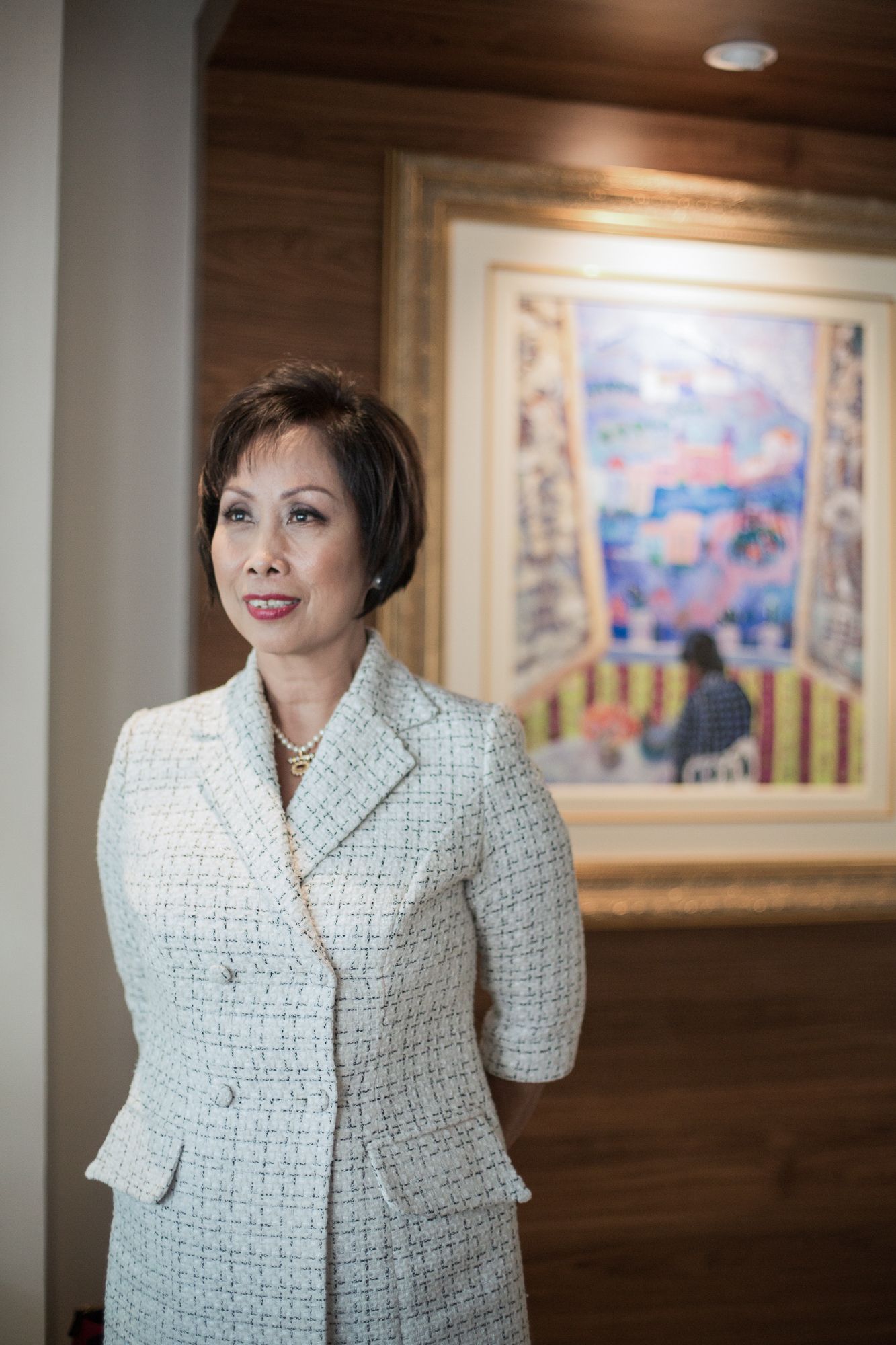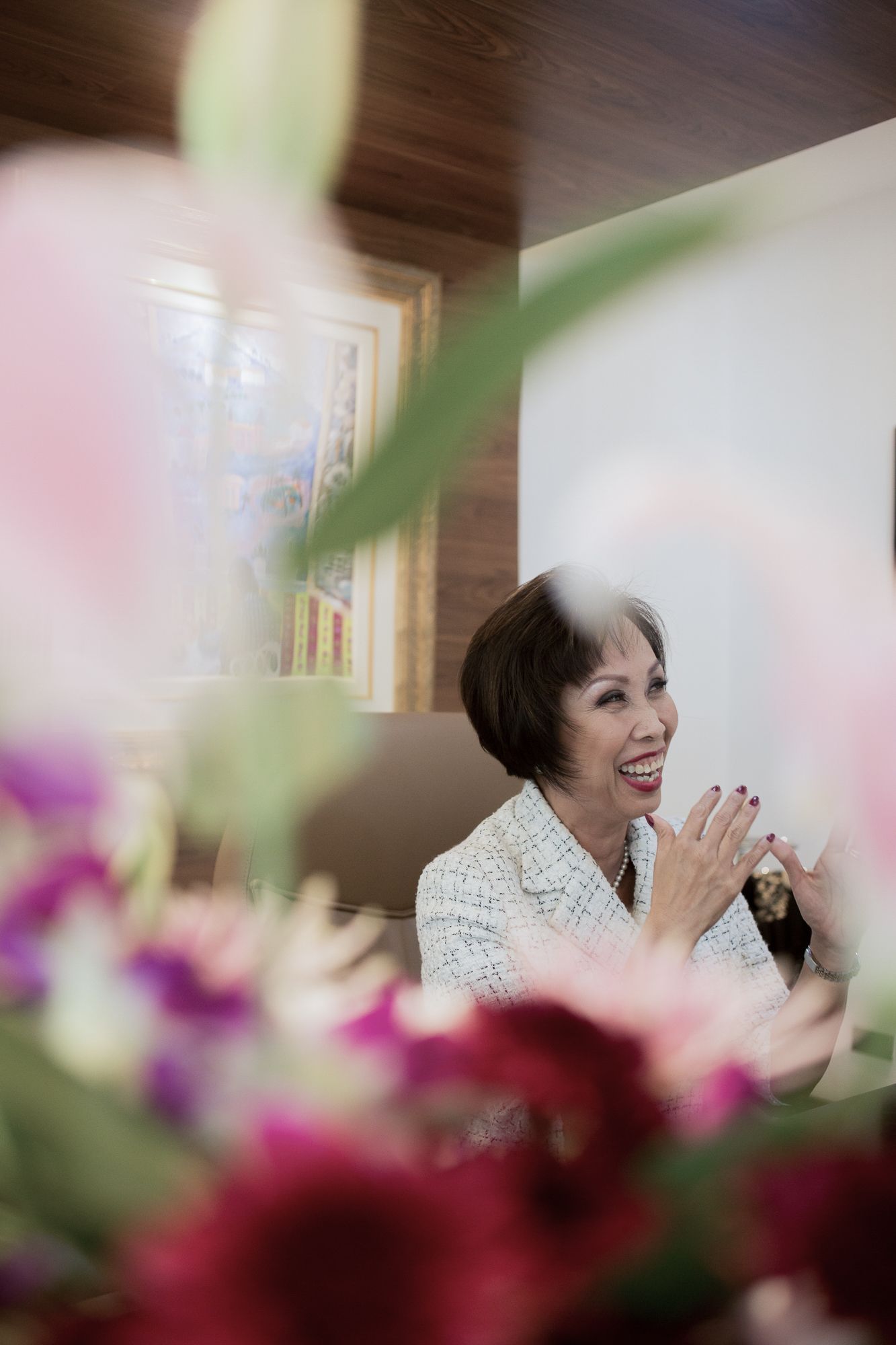Article
The Art of Leadership
 February 21, 2019
February 21, 2019
A bar topnotcher, an accomplished lawyer, and a seasoned Executive, Atty. Marilyn A. Victorio-Aquino is one of the most respected leaders in the First Pacific Group of Companies.
But very few people know about her greatest passion—painting. Gian Lao sits down with her to explore how her personal passions have contributed to her professional success.
If I didn’t know any better, I would have mistaken the MetroPac Movers office for a very busy gallery. The team inside is a portrait of efficiency, typing away in front of their computers. They are surrounded by paintings—flowers in watercolor, farmhouses in oil, abstracts in acrylic. Around the office, I must have counted almost thirty of these works.
“Where did you find these paintings?” I ask.
“Oh, these are all my work,” she says.
I forgot to mention that my tour guide was none
other than Atty. Marilyn A. Victorio-Aquino,
or Atty. MAVA, as she is endearingly called by her staff. We know her as President and Chief Executive Officer of MetroPac Movers, and Director of several companies in the Group. In her free time, however, she identifies as a painter.


MAVA in her office.
“I’ve been painting for a long time,” says Aquino. “Sometimes I’d stay up until 4 a.m. and I’d still be painting. That means I love what I’m doing.”
To Aquino, whose schedule is understandably filled with important meetings, making art is an opportunity to refresh her mind and to approach issues with a renewed sense of energy.
“Art helps me unwind. When I do a painting, I think of nothing else except my art,” she says. “Sometimes you need to get your mind off the work, just so you
can go back to it. When you’re always focused on a job, and you can’t seem to crack a problem open,
you need to get your mind off it.”
MAVA speaks with both authority and wonder. When one speaks to her, one is captivated by her wisdom, as well as her vibrancy and genuine love for what she does—whether it’s business, law, or art.
“There’s an artistry to painting, eh,” continues Aquino. “It brings a different perspective—the unquantifiable sense in your being. It’s made me a better person, definitely, because it provides an artistry even to approaching a problem.”
“Being an artist makes me more sensitive to approaching certain things. I appreciate the beauty of a shadow, and when I pass a tree, I can see the difference between shadows at 3 o’clock and shadows at 12 o’clock. This might have improved my sensitivity when I talk to people. You start appreciating that people are different. They have their own strengths and weaknesses. And you start appreciating that—sometimes—the solutions might be found out of the box.”
Aquino is arguably one of the country’s finest lawyers. Thus, the natural question that arises is: How does one reconcile the idea of art—a space for freedom, expression, and breaking boundaries—with legal practice, which evokes terms such as “the letter of the law”? Posed with this question, she thinks for a bit, before sharing some thoughtful insight.
“When the answer is as written in the law, you don’t need a lawyer,” she says. “Clients can just read the civil code and say: ‘Okay. These are my rights.’”
“Clients come to us when the issue is gray. If the answer is easy, you can just look at the Bill of Rights or the Miranda Doctrine or wherever. It’s in the law. But when you come to me, you’re more likely to ask: ‘Did they violate my rights when they did this to me?’ That’s what good lawyers are for. You argue. You take positions. You have theories.”
“When there’s nothing in the textbook, and nothing in the law, you advise the client. My first discipline was law, but it has spilled over to my art. That doesn’t mean I’m stiff. There’s nothing stiff about me, not even my personality!”
It takes a special person to spell out the importance of creative flexibility in the legal practice, especially to someone who isn’t very involved in the legal profession. But somehow, MAVA did just that. Suddenly, the art surrounding us gained new depths of meaning, at least to my naïve eyes. They became reminders of what good lawyers do. They don’t simply differentiate between black and white. They look at all that gray, and they give it color.
A HUMBLE UPBRINGING
We live in an era where almost everyone is grappling with some sort of existential crisis. “Sometimes I can hear my bones straining under the weight of all the lives I’m not living,” says novelist Jonathan Safran Foer. It is this immense and invisible pressure that prods us to ask: What do I want to do with my life?
MAVA, however, has always known.
“I always wanted to be a lawyer,” she says. “I didn’t dream of becoming anything else.”
“Maybe it’s because my father was an enlisted man in the army,” she later muses. “I was the eldest among six siblings, and my father died early. I needed to fulfill my dream. It’s that simple.”
“I studied, and I studied, and I studied. I did just that. I was single-minded, and I took the entrance exam only in one school—U.P. It was either confidence or stupidity. I just took it there, and then I passed, and then I did really well.”
She says all this with the tone of fondness and nostalgia—as if she was referring to a self that she outgrew long ago. But then, her demeanor is accompanied by a keen awareness of the tough lessons of her past—and these lessons allow her continued success.
“I’ve done so well,” says MAVA. “And I really think it’s because I had that fire in my belly, that desire to be accomplished. And I had God’s grace. You can never underestimate the combined impact of motivation and ‘lack’. Hunger is very, very important. Hunger in your stomach, hunger for achievement, hunger to fulfill your dreams.”
Sometimes it’s magical how telling a story can transform a person. And MAVA is a perfect example. When she tells this story, her entire persona morphs. Suddenly, you see that everything that she is—her wisdom, her artistry, and her personal gravitas—was built, and not inherited. She is a living example of hard work and overcoming one’s circumstances. She has never forgotten that—at one point—she was simply ‘Yeyen’.
“I was such a nerd [as a student],” says MAVA. “I studied so much, and my classmates would copy from me. I could read 24 cases at a time, and when they were called for recitation, my friends would always whisper to me: ‘Yeyen! Help me!’”
“Those were my law school days. I studied in the library, and I studied at home. I wanted to top the bar, so I went out and did it. I missed number one just by 0.25 points.”
That was Yeyen. She worked harder than everyone else, and was still somehow kind enough to help those who failed to read the cases. She made sure that they would succeed together, perhaps because that is what true leaders do.

THE ART OF LEADERSHIP
When asked about her leadership style, MAVA does not hesitate to speak.
“What works for one does not work for everyone else,” she says. “You need to inspire your people. You need to try to tap the best of their abilities.”
“Politics has very little place in MetroPac Movers,” she continues. “It’s a meritocracy, and everyone is appreciated. Even if you’re very quiet, I’ll ask your opinion to see where you’re coming from. I suppose it’s because I’m a mother. I like to nurture, and I like to inspire. Because when people are inspired, they give me their best. This is why I’m not afraid to ask my team for help.”
Every leader has mentors. Mark Zuckerberg had Steve Jobs. Bill Gates has Warren Buffet. And MAVA has none other than Manuel V. Pangilinan. Unlike other Executives, who treat their big bosses with reverence fit for a God, MAVA speaks about MVP as a colleague and fellow hard-worker, who she well and truly admires.
“The important thing about my upbringing with this Group…” says MAVA, “…is that perfection isn’t demanded. Mr. Pangilinan will not fault you for making a mistake. But he will fault you for not recovering quickly from a mistake.”
“If you make a mistake, and you explain that—with all the due diligence—the call was not right—that’s fine, as long as you recover from it. That’s one of his best features. When there’s an emergency, he will not say: ‘Give me the people who did this and I will chop off their head!’ He’s not that kind of person. Instead, he asks: ‘What’s the situation? Where are we?’ That’s the sign of a good leader—being able to accept the mistake, own up to it, recover, and correct the mistake.”
“You’ll never be perfect,” Aquino continues. “You will be scarred from time to time, but you need to remember the scars. Don’t make the same mistake again. That’s what MVP’s leadership is like.”
THE HUMANITY IN BUSINESS
As we speak about art and its role in shaping the world, MAVA often segues into her own philosophy about what business should be. And I realize just how easy it is to be inspired by a business leader who is in touch with her artistic and human sensibilities.
“Behind corporations are human beings,” she says. “Sometimes, people portray companies as monsters. But these same companies are run by people like me and you, and oftentimes, there’s no monstrosity in our mind.”
“Of course, we’re in the business of creating profit, but we often want to go beyond that,” she continues. “I like working with LGUs whose industries we can help grow. That’s where I find satisfaction in work, actually—when we are able to show that we have a heart.”
MAVA is a hyper-competent individual who can talk about the intricate details of doing business. She has a way of summoning the information that she needs almost instantly, which is a clear indicator of knowledge of the subject matter—of doing one’s homework. But when she talks about the social aspect of what her company does, her eyes light up.
“MVP always teaches us about social conscience, and about the impact we might have on the people and on the communities surrounding our operations. We are in industries that impact the lives of people, so it’s important that when we take a position—and when we undertake a business or a project—it’s not only driven by profit.”
There is a grace with which MAVA approaches her work. She manages to balance her personal passions with professional excellence, and profitability with promoting social justice. Over the course of her career, she has found success not simply in terms of her career, but in terms of creating the life that she envisioned for herself and her family—one that is driven humanity as much as it is driven by brilliance. Truly, it is impressive to witness; it is something we should all seek to imitate; one might even call it a work of art.







